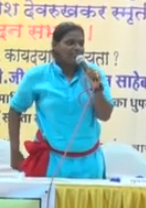Protest against Rs 50 lakh surety for student activist Suvarna Salve
More than a hundred individuals and members of organisations, including
students, womens’ rights activists, academics, lawyers, researchers, film-makers,
theatre makers, etc, have lodged a strong protest against the Mumbai police
notice to demand a surety of Rs 50 lakhs from student and anti-case cultural
activist Suvarna Salve.

The have demanded that this notice be dropped forthwith and that Mumbai
police undertake no repressive measures against Suvarna Salve or attempt to
censor her activities in any way. Furthermore, they demanded that the
Maharashtra government withdraw all the FIRs related to this and other cases
registered by Mumbai police against several activists and prominent citizens,
named and un-named, in connection with the peaceful protests against the JNU
attacks and the CAA-NRC-NPR across the city in January 2020.
Expressing shock at the notice issued on Aug 24, 2020, by Mumbai police for
alleged participation in a protest march on Jan 6, 2020, they said that Suvarna
Salve, who is also a well-known and popular anti-caste cultural activist, is the
lead singer of the group Samata Kala Manch.
Their statement said:
Clearly, the police have targeted this young singer and anti-caste cultural
activist with such a high amount as surety to intimidate her and anyone who
comes forward to support her. Besides, the attempt to enforce arbitrary and
ill-defined norms of ‘good behaviour’ is designed to curb her right to perform
in public and will have a chilling effect on her right to freedom of expression.
The surety notice was first reported in The Wire and Suvarna was quoted as saying that it was clearly done to harass her. “There were several influential people who had participated in the protest but they chose to go behind one student activist. They know I will never be able to furnish such surety ever. I belong to a Dalit community, and stay in a slum rehabilitation housing,” she said.
The Mumbai police notice has sought surety of Rs 50 lakhs from at least two
persons to ensure Suvarna Salve’s ‘good behaviour’ for the next two years.
The notice, issued under Section 110 (e) of the Criminal Procedure Code, 1973,
has sought an explanation from Suvarna Salve as to why proceeding should not
be initiated against her in connection with a First Information Report (FIR)
registered against her and 31 persons for a spontaneous protest march from
Hutatma Chowk to Gateway of India, where hundreds of citizens had assembled
to protest the bloody attack on students and faculty of the Jawaharlal Nehru
University (JNU) by members of the ruling Bharatiya Janata Party student wing,
the Akhil Bharatiya Vidyarthi Parishad (ABVP) on January 5, 2020, in New Delhi.
Leave alone this absurd, excessive and totally arbitrary amount, which can be
confiscated by the state if she violates the assurance of ‘good behavior’, Section
110 in The Code Of Criminal Procedure, 1973, which has been applied in this
case, classifies the student and cultural activist as a ‘habitual offender’ and police
have even said they will initiate proceedings to extern her from Mumbai.
Section 110 in The Code Of Criminal Procedure, 1973, deals with security for
good behavior from ‘habitual offenders’, like house-breakers, forgers, robbers,
thieves, those who commit kidnappings, abductions, extortion, cheating or
mischief, drug offenders food adulteration and the like. Sec 110 (e), under which
this notice was issued, is for anyone who ‘habitually commits, or attempts to
commit, or abets the commission of, offences, involving a breach of the peace’.
It may be noted that the morcha, which promoted the registering of this FIR
against Suvarna Salve and others, was an entirely peaceful and spontaneous
march and police were very much present at the spot. No untoward incident was
reported, no violence broke out as a result of the morcha and there was no
breach of peace whatsoever, in the wake of the morcha.
Indeed, citizens named in the FIR were not even present in the procession and
despite evidence of their lack of involvement, Mumbai police have persisted with
this case, exhibiting undue and disproportionate zeal in booking activists who
have raised a voice of dissent and exercised their right to peaceful protest. This
notice sets a very dangerous precedent for all voices of dissent.
It is shocking that a student activist who has never been booked in any case so
far, can be classified as a ‘habitual offender.’
Statements
Related

